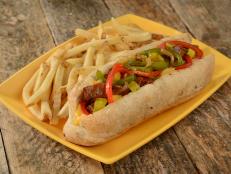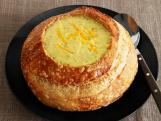Jewish Delis Across the Country Are Putting New Spins on the Classics
New spots are popping up everywhere — and completely redefining the genre.


Photograph by Jeff Herr Photography
The General Muir in Atlanta is one of many new takes on the traditional Jewish deli.
By Leah Koenig for Food Network Magazine
It’s a little after noon and a line of people waiting for takeout orders stretches in front of Mile End Delicatessen in Brooklyn. The popular deli had to close its dining room because of coronavirus restrictions, but that hasn’t stopped the fans from coming. First in line is a gray-haired man thumbing through a newspaper while he waits for his lunch of corned beef on pumpernickel. Six feet behind him, bearded twentysomethings wait to pick up seltzers and tuna sandwiches spiked with harissa.
In many ways, Mile End is as classic as a Jewish delicatessen could be — it has the quintessential matzo ball soup and a serious local following. But it’s also a whole new breed, with a stylish exterior of black painted bricks, a window lined with colorful jarred pickles and a menu full of Middle Eastern influences, like za’atar-rubbed grilled chicken and marinated eggplant and hummus pita. This modernized Jewish deli is a growing trend: In the past year — during a pandemic, no less more than a dozen new spots have been announced across the country.
Like Mile End, these 2.0 Jewish delis take an artisanal approach to their menu, offering innovative spins on traditional dishes. At Mamaleh’s Delicatessen in Cambridge, MA, diners can order a classic Reuben sandwich — or a version made with smoked portobellos in place of the corned beef. In San Francisco, Wise Sons Jewish Delicatessen dishes out its own take on the Reuben, replacing the sauerkraut with a layer of kimchi, inspired by co-owner Evan Bloom’s wife, Jessica, who is Korean-American. And at Call Your Mother in Washington, DC, sesame bagels and cream cheese are sold alongside za’atar-sprinkled bagels and a candied-salmon schmear.
These unexpected, often vegan or vegetarian spins on classic Jewish comfort food have attracted a new generation of fans, and you’ll often find these folks noshing alongside grandparents who love an early-bird special. “Most of our customers are just looking for a good Jewish deli,” says Andrew Kalish of Sam & Gertie’s Vegan Jewish Deli in Chicago. “They’re not necessarily vegan, and they don’t notice or mind the fact that we are 100 percent plant-based.”
This is a far cry from the 1880s, when the Jewish deli got its start in America. During that time, German immigrants, many of whom were Jewish, began arriving on New York City’s shores, bringing their love of sausage and sauerkraut with them. Before long, aspiring shopkeepers began operating pushcarts and opening small butcher shops in Manhattan stocked with these nostalgic dishes.
A generation later, at the turn of the 20th century, a wave of Eastern European Jewish immigrants arrived, largely settling on the crowded Lower East Side. Romanian Jews introduced pastrami-making techniques that would transform delis from glorified takeout counters into the sacred temples of meat and bread they are today. Around the same time, appetizing shops (stores that specialize in smoked and cured fish — such as lox — cream cheese and other foods that belong on a bagel) sprang up across New York City. Kosher food laws prohibit mixing milk and meat, so the deli provided all things related to cured and pickled meats, while the appetizing counter supplied fish and cheese. Today, many Jewish restaurants blend elements of the two stores under one roof.
“Delis provided a sense of community for newcomers to a strange land and combined far-flung food traditions from the Jewish diaspora into something uniquely American,” says Jennifer Johnson, who co-owns the upscale Jewish deli The General Muir in Atlanta.
By the early 1930s, New York City was home to more than 1,500 kosher delicatessens where you could get pastrami, corned beef and brisket sandwiches, as well as other Eastern European Jewish classics: steaming bowls of matzo ball soup, hefty potato knishes, creamy chopped liver and mouth-puckering pickles.
Some of the most iconic of these restaurants — like Katz’s and 2nd Avenue Deli in New York City, or Langer’s and Canter’s in Los Angeles — still draw impressive crowds. But in the latter half of the 20th century, many of these older delis shuttered, in part because of a national backlash against saturated fat. In his 2009 book, Save the Deli, author David Sax crisscrossed the country, noshing on pastrami and chronicling the loss of American deli culture in an attempt to revive the nation’s enthusiasm for deli food. “Everywhere I looked, delis were dying,” he wrote.
But his travels also hinted that a revival was on the way. “There was an appetite for a new type of Jewish delicatessen,” he wrote. “One that blended the traditions of the past with the ideals of the present.” A decade later his prediction is coming true.
Deli Delivery
These legendary spots ship nationwide.
Kenny & Ziggy's, Houston
When Ziggy Gruber moved to Houston in 1999, he realized “a life without a great deli is really no life at all.” Today he serves all the essentials plus dishes like goulash and stuffed cabbage.
Liebman's Deli, Bronx, NY
Liebman’s opened in 1953, when there were more than 100 Jewish delis in the Bronx. Now it’s the only one. Order the giant latkes — they come with a pound of applesauce for dipping!
Katz's Deli
You probably know Katz’s from that iconic When Harry Met Sally...scene. The pastrami, sold by the pound, is a must-try; it’s slow-smoked for more than three days.
Wexler’s Deli, Los Angeles
Wexler’s is the only LA deli that smokes and cures fish in-house. In addition to old standards like lox and whitefish, it sells twists on the classics, including pastrami lox and barbecue cod.
Old or new, the best delis offer more than just a great meal. They are a place to meet with friends, linger over a bowl of soup and trade jokes with the gruff but gold-hearted servers. And they go a step further, transforming traditional flavors into beloved trends: Everything bagel seasoning! Pastrami-spiced lox! “We want the past to inform the future,” Johnson says. “To honor tradition but not be bound by it.”
Molly Yeh's Favorite Deli

Photograph by Dan Wolf
Chicken Soup with a Matzo Ball, The Bagel in Skokie, IL.
By Molly Yeh for Food Network Magazine
Eating at delis was as much a part of my childhood as was doing homework, just much more enjoyable. The deli that will forever be *my* deli was The Bagel in Skokie, IL, in the middle of the mall where I got all of my homecoming dresses. The Bagel felt like a speakeasy — a pastrami speakeasy.
The dark wood furniture and big red booths were not where middle-school girls came to take a break; this was where locals of my grandparents’ generation had an early dinner and where my family would go whenever the craving struck for the kind of comfort food that came only in shades of brown and beige. For more than 20 years my order consisted of freshly sliced bologna on challah and a bowl of chicken soup with a softball-size matzo ball. My mom would get a bagel and lox, and my dad would glow over a huge bowl of the Mish-Mash Soup, which was like all of the soups on the menu combined. The hardest part of the meal was not filling up on the baskets of bagel chips, onion rolls and challah slices that greeted us when we sat down.
It wasn’t until a couple of years ago that I thought I’d grow up and change my order from a bologna sandwich to a sophisticated salmon platter. The salmon was good, but something just didn’t feel right. A few months later, The Bagel closed its doors forever. I’m still craving my final bologna sandwich.
Credits:
Photograph of The General Muir Restaurant by Jeff Herr Photography.
Photograph of Pastrami Poutine by Andrew Thomas Lee.
Photograph of Carrot Miso Matzo Ball Soup by Jim Sullivan.
Photograph of Vegan Laks by Kat Cole.
Photograph of Shpringen Katz! by Fred + Elliott.
Photograph of Chicken Soup with Matzo Ball by Dan Wolf.
Related Links:







































